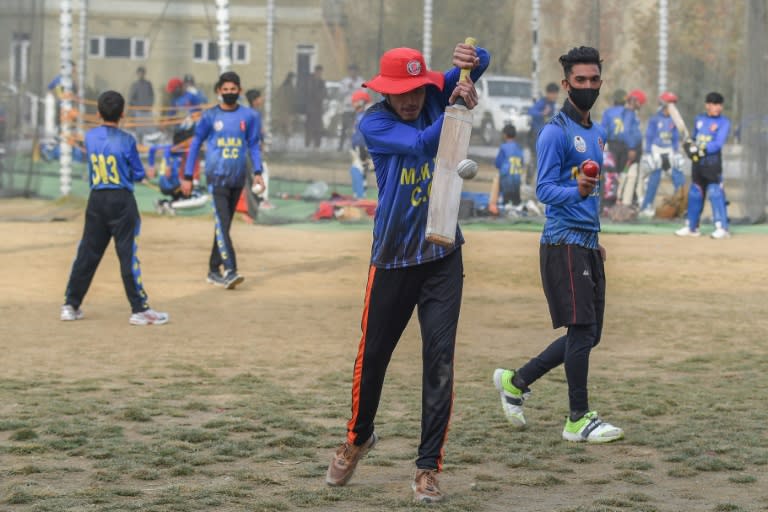
In a central Kabul street, the sound of kids playing was once mostly the scuff of a football against concrete. Now, it is punctuated with the crack of a cricket bat.
From pickup games in dusty parks or narrow alleys to high-intensity training at well-kitted academies, young Afghans have cricket fever — a trend spiked by the surprise performance of the Afghan national team at the recent ODI World Cup.
“I’m crazy for cricket,” said 19-year-old Shamsullah Mangal, who trains at a privately funded academy, having been inspired to take up the sport by national team player Rashid Khan.
Since the Taliban’s takeover of Afghanistan in 2021, the sport has emerged as a rare arena of national unity, with the Afghanistan Cricket Board working hard to expand facilities, giving young players a route to potential sporting stardom.
“Cricket in Afghanistan has a shorter history compared to other countries, but Afghanistan has great natural talents,” Mangal told AFP.
“If players are supported, and facilities are provided, we will see a great Afghan team in future.”
Cricket was first popularised in Afghanistan around two decades ago, when refugees who fled war to established cricket-playing countries brought it home.
Now, the sport’s popularity is skyrocketing.
“Afghanistan cricket is not just a sport anymore, it has turned into an industry,” said former cricket board CEO Lutfullah Stanikzai.
Decades of war and meagre economic resources, however, pose major funding and infrastructure challenges, with the isolation of the Taliban government on the world stage creating still other hurdles.
– ‘Only cricket represents us’ –
Even at the well-funded Mohammad Mirza Katawazai Cricket Centre, trainees have to head to Pakistan when Kabul’s harsh winter hits, as the club’s indoor training facilities are still under construction.
With much stacked against the Afghan national squad, wins against several top teams in their most-successful-ever World Cup in November were all the sweeter: none as much as the one against Pakistan.
“Had they won the (World Cup) trophy, it would not have made me as happy as when Afghanistan won against Pakistan,” said Hezbullah Fateh, a spectator at a recent regional match.
Pakistan was one of the countries where Afghans first fell for the game, but the nations’ relations have long been fraught.
Since October, thousands of Afghans have fled Pakistan to avoid deportation after Islamabad ordered all undocumented migrants to leave.
After the World Cup win, Afghanistan’s captain dedicated the win to those returning.
“These days, only cricket represents us on the international stage and presents a good image of us,” said Zeeshan Shaheir, another match attendee.
– ‘Dream and ambition’ –
Senior officials in the Taliban government have embraced the national team’s success, holding receptions for the players after tournaments and even posting on social media to salute their victories.
With the Taliban authority’s tacit approval, the team still uses the flag of the old republican government as an emblem, even though it has been replaced everywhere else in public by the armed group’s black-and-white standard.
That support only extends to the men’s team, however. Women have been barred from most aspects of public life — including sports — since the Taliban took power.
The Afghanistan Cricket Board (ACB) is funded by contributions from the sport’s governing body the International Cricket Council, sponsorships and government funding.
The ACB has 25 academies around the country and is building more, spokesman Sayed Naseem Sadaat told AFP, with private companies running many more.
The board has also been granted land to build a “huge” cricket complex in Kabul, with construction slated to start next year, Sadaat said.
It will be the kind of arena Mangal dreams of playing in, as he works at a shop to support his training and hopes to one day put on the national jersey.
The rewards can be life-changing.
Spinner Rashid Khan, Afghanistan’s top player and one of the best in the world, earned $1.8 million playing for the Gujarat Titans in the Indian Premier League this year.
That was on top of the hundreds of thousands of dollars he earned playing in leagues elsewhere in the world, often joined by his national teammates.
“This is my dream and ambition to play one day for the national team and achieve great things for Afghanistan,” said Mangal.
qb-sw/fox/aha/sco
Article courtesy of
Source link